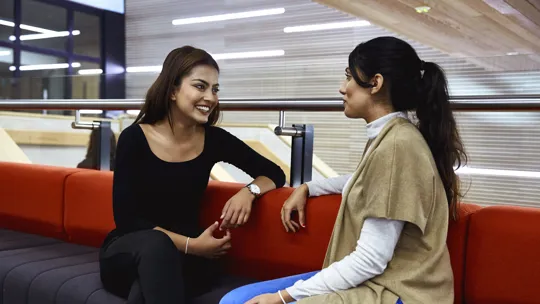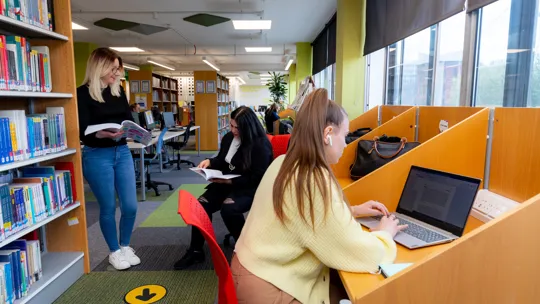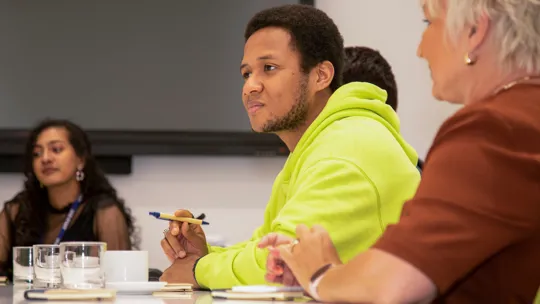Developing independent learning and academic excellence
At University College Birmingham, students are encouraged to develop independent learning skills that prepare them for academic success. Whether through lectures, seminars or practical lessons, the emphasis is on building student responsibility and engagement with course material.
The University will guide you on setting achievable goals and staying organised and motivated. Students also benefit from clear academic expectations at every level, from undergraduate to postgraduate study, ensuring a well-rounded and comprehensive educational experience.
Jump to section:
Independent learning
One of the biggest challenges facing university students is learning to take responsibility for your own learning. At first, you may feel like university life is a dream. There are no teachers monitoring the way you are dressed, or constantly reminding you to do homework or attend lectures. Sounds great, right? Well, it can be, but you may soon realise that this newfound freedom comes at a price: all the responsibility for your studies now rests on your shoulders.
Organising timetables and remembering assignment deadlines can feel overwhelming. Here are some simple steps you can take to become an independent learner:
1. Be organised
We know that sounds boring, but at the very least, download an online diary where you can write all your lecture times, room numbers and assignment deadlines. Even better, block out times when you are on campus that you can use to study. If you build study time into your timetable from day one, it will become a habit, and you will be less likely to leave everything to the last minute. See the ‘Planning Assignments’ section of this page for more specific advice about staying on track with your academic work.
It’s also a good idea to keep a record of all of the equipment you will need to bring to class on different days, especially if you are on a course with a practical element. There is nothing worse than arriving at a practical Culinary Arts Management degree class with no chef whites or coming to your Business Enterprise seminar without your notes!
2. Set achievable targets
Have you heard of SMART goals? Any goals that you set that should be Specific, Measurable, Achievable, Relevant and Time-bound. The most important is 'achievable'.
We live in a world where we are told that we can study, have hobbies, socialise, raise a family and work all at the same time without breaking into a sweat. This is a lie. Too many students try to fit too much into their timetables and become overwhelmed as a result.
Get a pen and write down how you spend your time on an average day. Include sleep, university time, socialising, cooking, exercising, travelling, doom-scrolling – anything that you do on a day-to-day basis. Then look at how much time is left. Divide it in half. That number is how much time you can realistically expect to spend studying per day. It may only be an hour or two (or less). That may not sound a lot, but if you use that time every day, it will add up to a healthy amount of study throughout the semester. By being realistic about the time you can spend on your studies, you will find that you have a much better chance of sticking to your goals.
If you are a 'sprint worker' (i.e. a student who likes to work hard at deadline time), that is fine, but make sure you give yourself a realistic amount of time to finish an assignment. If you are going to work this way, block out the weekends leading up to your assignment deadlines so that you can focus on getting them finished on time.
3. Find a place to work
Have you ever found yourself cleaning the kitchen when you should be writing your assignment? You’re not alone! Lots of students struggle to work at home because they get too distracted. The solution is to find somewhere you can focus.
That could be the university library, another study space on campus, a cafe or any other place that helps you focus on your work. It can help to work in a busy place, like a library, where other people are working, too.
Don’t live near campus? University College Birmingham is a member of the SCONUL Access scheme, which allows you to apply to use the study space of a university library near you. Contact the University College Birmingham library for more information.
4. Be motivated
This is often easier said than done. It is not uncommon for students to jump out of bed to attend morning lectures in week 1, but to struggle to be on time for afternoon lectures in week 8. Everyone has days when it is hard to sit down and work. When that happens, you can use one of these methods to get motivated again:
- Don’t wait until you are in the mood to study. You will hardly ever wake up "in the mood" to research an assignment or create a presentation, but often, the more work you do, the more motivated you become! You might find that it takes more effort putting off a task than actually doing it.
- Visualise how you will feel once the task is completed. In the middle of a semester with deadlines looming, it can be difficult to remember why you chose to complete your course in the first place. If you are feeling overwhelmed, take some time to imagine what your life will be like once you have graduated. Think about why you made the decision to start your course and use that as motivation when it becomes difficult!
- Make yourself accountable. Self-motivation is not easy, so outsourcing your motivation by telling another person your SMART goals for the week can help to keep you accountable. Try to pick somebody who will encourage and support you, even if you do not achieve your goals. Even better, why not pair up with a coursemate you can study with?
5. Be proactive
The most successful learners are those who do their own research into a topic. Your module reading list is a great place to start, but try to branch out to find other relevant academic information too.
You can also be proactive about seeking academic support. Book appointments with the Academic Development Tutors and Academic Librarians in the Academic Skills Centre and use these appointments as personal deadlines. If you know you want to complete half of your assignment before the end of the month, schedule a support appointment to encourage you to get words on the page. You'll also get some valuable feedback about your research, referencing and writing.
In addition to academic support, you can always get health and wellbeing support at University College Birmingham. You can find out more about these support services here.
6. Clock off
Treat your university work like a job. Give yourself a start time and a time to finish, and schedule in any breaks you might need. Be kind to yourself – you can’t work nonstop!
Be strict about taking time off from your assignments, whether that is a lunch break or a whole weekend of rest. It is important to give yourself some time off so you can come back refreshed when it is time to work again. You will probably work more efficiently once you have had some time away.
Planning assignments
As a student at University College Birmingham, you are expected to attend all of your classes and submit your assignments on time. This means that you will have to plan your time carefully to ensure that you meet your deadlines. This can feel like an impossible task, especially when you have other obligations, like families, jobs or multiple assignments.
Start planning as soon as you receive your assignment remit. Break the writing process down into the following stages:
1. Understanding the assignment remit
Give yourself time to understand what the assignment is asking you to do. Highlight key words in the task itself and in the Task Guidance section of the remit. This stage will prepare you to research and write, so take your time. You can learn more about assignment remits here.
2. Researching
How much time will you need to find credible, relevant sources for your assignment? Remember, this stage can take longer than you think, so plan accordingly. Use the University College Birmingham library’s subject guides to help you get started.
3. Reading and note-taking
How long will you need to read and understand the sources you found? Make sure you provide plenty of time for this stage. The more you read and take notes, the easier it will be to plan and write your assignment.
4. Planning
How long will it take you to plan the structure of your essay? Use this stage to decide which topics you will discuss in which order. Start thinking about which sources you will use to support your ideas.
5. Writing
How much time will you need to get words on the page? Your first draft doesn’t have to be your last, so allow some time for creating more than one version of your assignment. Clearly label all drafts so you know that you are working on the most recent version.
6. Editing
How long will it take you to read your entire assignment, including the references, to make sure that all content, grammar, punctuation, etc. is correct? Plan time for support - you can ask someone you know to proofread your assignment, and you can also book an appointment with the Academic Skills Centre to make sure your assignment is in tip-top shape before submission. Visit the Editing and proofreading section here for more tips about getting your work submission ready.
7. Submission
How much time will it take to submit your assignment? Plan more time than you think to allow for any technological issues. Don't wait until the last minute!
Estimate how much time you might need for each stage. If it’s January, and your assignment is due at the end of March, your plan might look like the one below:
1. Understanding the assignment remit (1-2 days – 15-16 January)
2. Researching (2-3 weeks – mid-late January/early February)
3. Reading and note-taking (3 weeks – late January-mid February)
4. Planning (2-3 days – mid February)
5. Writing (2-3 weeks – late February-early March)
6. Editing (1-2 weeks – mid-March)
7. Submission (31 March)
Remember: these dates do not have to be set in stone. It is normal for certain stages to take more or less time than you planned. If you need to, reassess your schedule and keep going!
For information about planning longer assignments, visit the Managing research projects section here.
Types of learning
The average university course involves the same key elements: lectures, seminars and assessments. You can find out more about lectures and seminars below. Assessments are any graded pieces of work you will complete for your course, like essays and exams. However, at University College Birmingham, depending on your course, the ways you will learn and how you will be assessed on that learning are much more varied. Here is a short guide to some of the ways you may be taught at University College Birmingham – but remember the actual content will depend on your course.
Lectures
A traditional lecture is a one-way flow of information, with a lecturer standing at the front of a large lecture theatre delivering the core content of a course to a hundred or so students making notes. While lectures still exist, the format is becoming increasingly more interactive. Student numbers are often much smaller, lectures are usually recorded and you will be given the chance to participate throughout the lecture rather than waiting to ask questions at the end. However, one thing that has not changed is that lectures are still the place where you find out about key course content, and attendance is a must.
Seminars
Lectures are your introduction to new concepts and ideas. Seminars are where you can explore them in more detail. Seminars happen in much smaller groups than lectures and involve a detailed exploration of one topic (usually what was covered in the lecture that week). You will be expected to participate in every seminar, so it is important that you come prepared. That might mean researching a topic independently or with a small group of students before the seminar or completing the set reading. Seminars may feel daunting at first as you will need to speak up and get involved, but most students find that this is where real understanding of the course material happens. Plus, attending seminars is a great way to meet people on your course.
Practical lessons
Learning at University College Birmingham is often not restricted to the classroom. Many courses involve practical training, so you may find that you are in a lecture theatre in the morning, but in an industry-standard kitchen or our replica of a Boeing 747 in the afternoon. These sessions will be designed to give you a head start in your future career, and you may also be given a chance to gain additional real-world experience on placements, as well as learning in our world-class facilities.
Academic Skills Outcomes
Every course at University College Birmingham has its own subject-specific content. However, no matter what your course, there are basic academic skills that all students are expected to learn and display throughout their degree. These include planning, structuring and writing academic assignments; participating in seminars and giving presentations; and finding, evaluating and using academic sources. You can visit the Academic Skills section to learn more about how to develop many of these skills.
At our university, these required skills are outlined in a set of Academic Skills Outcomes. What is expected of you as a student will change as you progress through your course, so each year of study has different outcomes. You can access the full list of outcomes as a University College Birmingham student, but here is a summary of what you will be expected to do during your undergraduate and/or postgraduate course.
Note: All universities in the UK follow national degree standards called qualification levels. Levels 4-6 correspond to years 1-3 of an undergraduate degree. Level 7 is a master's degree.
Level 4
This is your first year studying at university level, so the Academic Skills Outcomes that you will need to meet will probably be a step up from what you were doing at school. The main difference will be having to include sources in your work.
At Level 4, your lecturers will be checking that you can read and understand journal articles and academic books and that you can reference them accurately. The writing you will be asked to produce will probably be descriptive (i.e. it will check that you can explain key concepts and ideas), but if you can compare and contrast main themes from your area of study, your score will improve.
It is also important to pay attention to the style of your written work. You can find the formatting standards for written assignments at University College Birmingham here.
Level 5
In your second year of university, you will continue to apply all of the basic research and planning skills that you developed last year, but you should be using more sources in your work and thinking and writing about them more deeply. This means being more critical in your assignments. This does not mean that you find fault with every concept or idea. Rather, it means that you are able to effectively evaluate competing ideas and theories.
You can find out more about what it means to think and write critically here. You will start to show an understanding of industry-informed practices and be able to present convincing conclusions and recommendations at the end of your assignments. Many students also find that Level 5 is the time when they master structuring assignments - it is amazing what a difference a good introduction and strong topic sentences can make to your grade!
Level 6
Well done! You have reached the final year of your course – that is a major achievement. However, many students feel that Level 6 presents the biggest 'jump' in academic expectations, so this is not the time to relax. In your writing, you should be even more critical, and you should now be synthesising sources, which means putting together information that you have taken from your sources to give a coherent response to your assignment task.
If this sounds difficult, now might be the time to book an appointment with an Academic Development Tutor, who can offer you guidance (and encouragement). Some courses may require you to undertake a research project, like a dissertation, at Level 6. This presents a new set of challenges in terms of organisation and research, but by this stage of your degree, you should be able to meet them.
Level 7
So, you have decided to pursue a master’s degree. Having successfully completed your undergraduate degree, you have already displayed that you have a good understanding of academic skills and may be wondering what more there is to learn. Well, at Level 7, everything is about depth and detail. Yes, you know how to synthesise sources, but now we want you to add more of your own voice to your assignments. In other words, it will no longer be enough to simply gather evidence to support a position.
Now, you should also be able to use texts to evaluate theories, refute them or point to gaps in the current research. More importantly, your work should now be adding to the current body of knowledge in your discipline by improving and expanding existing models and theories. This is a lot more than was expected of you at undergraduate level, but it is 100% achievable if you are able to plan, research and write effectively.
Support for students
For information about every stage of researching and writing your assignments, visit the Assignment Life Cycle on Canvas (login required).
Discover more

Learning Hub
Explore the Learning Hub for insights on diverse learning methods, assignment types, and essential skills. Learn more about the academic support we offer.
Read more
Disability and neurodiversity support
We are committed to providing an inclusive learning environment, and our DNS team is here to advise you and provide assistance throughout your studies.
Read more
Financial support
While studying, it is important to manage your finances and access any help to which you are entitled. Our staff are here to give you the support and advice you need.
Read more
Academic support
Get academic support with one-to-one appointments, workshops, and online resources for writing, research, and exam prep. Maximise your academic potential!
Read more
English language support
We offer support to improve academic English, whether you're a non-native speaker or a native speaker refining your skills.
Read more
Helping you get hired
Hired is our dedicated careers, employability and placements service for students and alumni at University College Birmingham.
Read more
Health and wellbeing
We know good health and wellbeing are essential for you to enjoy your university experience and study effectively. Our dedicated team are here to help you.
Read more